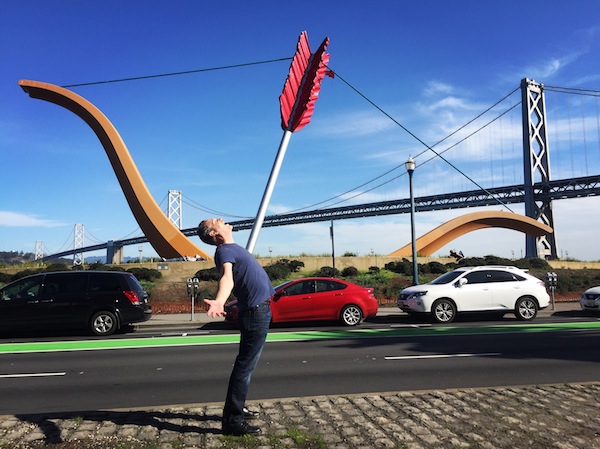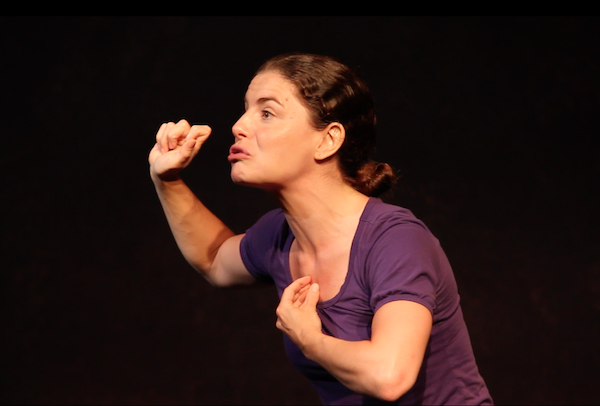Naomi Vogt performs in Big Sister, written by her real-life sister, Deborah Vogt. (photo from Fringe)
The Vancouver Fringe Festival has started and there are (at least) a few shows that readers should try to fit in around the High Holidays. Jewish community members Deborah and Naomi Vogt, David Rodwin and Gemma Wilcox are presenting very personal works that examine issues with which we all deal, such as self-esteem, family relationships, finding and losing love, and the search for meaning. And they do it with humour and energy.
Local playwright Deborah Vogt and her sister, actor Naomi Vogt, “are still making tweaks” to Big Sister (Revue Stage), Deborah Vogt told the Independent. “However, I’m not sure if there will ever be a ‘final version,’ given that the script is a reflection of our ongoing conversation as sisters attempting to learn more about each other. Additionally, Naomi loves to ad lib and so the play will be slightly different every evening depending on who is in the audience. However, the dream would be to take it to other Fringe festivals, especially Edinburgh (the world’s largest Fringe Festival – and my personal dream). There is something very special, however, about premièring this show in the city that we grew up in and the community that we know and love.”
The idea for the show came up last summer at the Edinburgh Fringe. “Over there, I saw so many beautiful, personal solo shows that tread the line between monologue and standup. I thought, ‘I would love to do this, but I can’t act. Who do I know that could perform a solo show that I could write?’ The answer was obvious: my sister. We spent two weeks traveling together shortly after the Fringe, where we brainstormed ideas for shows in between hikes and wine bars. We abandoned most of those ideas when we realized the only story we could honestly tell was that of our relationship as sisters, and specifically how our relationship has changed over the last few years in the wake of Naomi’s 75-pound weight loss.”
Camp Miriam makes an appearance in Big Sister, said Vogt, “because my sister Naomi went there for a few summers as a preteen and our mother went there for many, many years when she was younger…. The show focuses on Naomi’s weight loss, and talks about what being a fat kid at camp was like. Naomi loved Camp Miriam, but we also acknowledge that no camp experience is easy if you don’t look like the other children.”
Naomi Vogt performs the whole play. “For the most part,” said her sister, “she is playing herself, but the version of herself that I have written through my perspective. And, on occasion, she plays me as well. I just have to sit in the audience every night and hear the ways she’s manipulating my words. Part of the joy of the show is the various power dynamics at play – as a playwright, I have shaped Naomi’s personal story but, as an actor, she is able to change my words at any moment.”
There were many challenges to writing Big Sister, said Vogt. “First of all, it was difficult trying to find the balance between Naomi as my real human sister and Naomi as a character. We wanted this show to be entirely truthful, while still presenting a piece of theatre. And this show touches on painful aspects of both of our lives (in a funny way, of course), so trying to write that without overstepping my place or lying to the audience about what actually happened (two sides to every story, right?) was difficult to manoeuvre.”
In a nutshell, the show is about weight loss. “It touches on how being heavy can affect all aspects of life, and particularly sibling dynamics,” said Vogt. “Both of us have lost weight … but Naomi’s journey was far more significant than mine. Through telling her story of weight loss, we’ve learned a lot about each other, our childhoods and the community we live in.”
* * *

“F* Tinder is 100% autobiographical,” said David Rodwin. “Only the names have been changed. But I only have 75 minutes to talk about dating 120 different women over two years, so there’s a lot I have to leave out. But every story I tell, I do so as accurately as I can recall – with a theatrical flourish.”
F* Tinder: a love story (Performance Works) began as a book, when a friend who was writing his first book challenged Rodwin to do the same.
“I’d moved to San Francisco after my last serious relationship ended in L.A. and, over a year and a half on Tinder and other apps, I’d experienced some bizarre and noteworthy experiences in the lawless dating wilds of the Bay Area,” he said. “So, I had an unorganized collection of short stories I’d been developing…. Around that time, I met the one woman I truly fell in love with. That inspired me to write like crazy. But (spoiler alert), when she dumped me, I got writer’s block for the first time in my life.
“Though I wasn’t able to continue sitting alone at my desk typing out these tales, I couldn’t stop telling them to friends and in storytelling shows like The Moth, which I’ve done for years. Finally, it became clear that, rather than just a bunch of short anecdotes, this was a full evening of stories with its own narrative integrity…. And though I’d written half the book, I threw out everything and started over because I find that writing with my mouth creates a more natural, humorous and vibrant live performance than when I type something, memorize it and recite it.
“It’s a thrilling and terrifying process for me each night, not knowing quite how it’s going to go and I hope it creates a more visceral, authentic and deeply intimate experience. And it’s a technique I inherited from my mentor Spalding Gray. But it’s meant that the show has changed a lot over time. The first version was 60 minutes long, then it grew to 90 minutes. Now, it’s 75 minutes. But there have been multiple versions of each one…. I’m also able to adjust certain sections to fit specific audiences. I’ve even added a curling joke for my Canadian audiences, making fun of Americans’ inability to understand the sport.”
Rodwin continues to work on the book F* Tinder and, later this year, he said, “I’ll begin directing a web series of F* Tinder set in San Francisco, and also a feature film of my previous show set in Los Angeles, called Total Novice. That one has an even edgier narrative than F* Tinder, if you can believe. Let’s just say I was a ‘nice Jewish boy’ who went to Princeton and I was a very late bloomer who became fearless (and occasionally stupid) in my pursuit of things that I considered off limits when I was younger.”
F* Tinder includes Jewish elements, said Rodwin, “because they directly affected how I look at relationships.”
In the show, he shares how, on one Shabbat, while chanting prayers he’d said for 30 years, he stopped midway through the V’ahavta, “when I said, ‘And thou shalt teach them diligently unto thy children.’ It suddenly hit me that I didn’t have children, and I couldn’t fulfil this prayer in a literal way. I always thought eventually I would. But, at 45, when I read that, I fell silent, contemplating how I’d lived my romantic life in such a way that I was childless. And what it meant for me. And what I should be doing with the woman I was in love with. And it directed my next choice in how that relationship went.”
Rodwin shared another touching, and Jewish, element of his show.
“The woman I fell in love with told me she could tell I was falling for her and I shouldn’t do that because she’d already decided we weren’t going to work out in the long term, and she didn’t want to hurt me. So, she told me to build a wall around my heart, or she wouldn’t see me again…. I agreed to do so because I was afraid if I told her the truth, that I was already hopelessly in love, I’d never see her again. Now, I’m not a biblical scholar, but the next morning a piece of Torah came to my mind, out of the blue, while she lay sleeping next to me. Deuteronomy 30:6 – I’d studied it eight years earlier with Rabbi [Sharon] Brous and I didn’t understand it, so it stuck in my mind. The phrase, ‘You must circumcise your heart … so that you may live,’ baffled me. But, that morning, it suddenly made sense to me, and I decided I had to circumcise my heart and careen it against the wall around her heart until I either broke through or I broke. And people can come see the show, to discover the surprising ending.”
* * *

There are many twists and turns in Magical Mystery Detour (Studio 1398) by Gemma Wilcox. Set in the United Kingdom in 2012, the action is prompted “by a letter from her dead mother, [and] the protagonist, Sandra, and her dog, Solar, take an unexpected car journey from London to Land’s End, Cornwall, at a pivotal and sensitive time in her life.”
Created in the summer of 2012, Magical Mystery Detour premièred at the Boulder, Colo., Fringe Festival that year.
“It is a semi-autobiographical piece, heavily based on aspects of my life at that time,” Wilcox told the Independent. “I wrote this show very shortly after the death of my mother and the ending of a very significant love relationship with a man I thought I would marry and have children with. It was inspired by the tender and vulnerable process of dealing with and letting go of my mother’s death, the getting over and releasing this powerful love relationship, as well as some of my magical journeys through the sacred, beautiful landscape in the southwest of the U.K.
“The show reflects some of the themes I was fascinated by and exploring at that time in my life,” she continued, “such as learning how to trust and surrender to the detours that happen in life, when we think our life is going in a certain direction, but then it dramatically changes. I was also interested in exploring how we can find and trust our own centre when those we love are not there anymore, and when we feel lost or that life is too chaotic or not going the direction we want it to.”
Wilcox was born and raised in London, and moved to the United States in 2001. She has been based in Boulder since 2004. “I moved to the U.S. to explore yoga and embodiment practices, was in the Shakespeare Company in Austin, Tex., for a couple years, and found my theatrical/creative family in Boulder, as well as touring across the U.S. and Canadian Fringe festival circuit every summer for the past 11 years,” she said.
Magical Mystery Detour is one of a handful of shows that Wilcox and director Elizabeth Baron have worked on together. In creating it, said Wilcox, Baron was incredible, advising “me on how to stay both open and vulnerable as a performer, whilst also staying protected and safe and able to show the many shades and subtleties of a character.”
Wilcox writes comedy-dramas. “I find that it is highly important to balance the ‘light’ material with the ‘darker’ material, humour with seriousness – for me as a performer, and also for the audiences,” she said. “It is easier to receive and digest more poignant or shadowy material when juxtaposed in appropriate moments with humour and lightness. Humour is a huge aspect of my work – humour that comes from identifiable and sometimes embarrassing situations or honest admissions.”
For the full Fringe lineup, visit vancouverfringe.com. The festival runs to Sept. 16.

